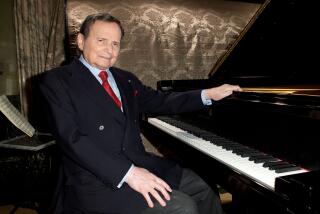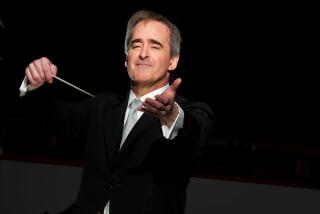James Tyler dies at 70; founding director of USC’s early music program
James Tyler, a versatile musician who was the founding director of the early music program at USC, has died. He was 70.
Tyler died Nov. 23 at Kaiser Permanente Los Angeles Medical Center after a short illness, said his wife of 35 years, Joyce.
Tyler was best known for playing the lute and he specialized in early music performances, which generally include about 800 years of compositions covering the Medieval, Renaissance and Baroque periods until 1750. Musicians play original instruments or ones patterned after those used during the period, so the sounds produced are different from the modern versions.
He came to USC in 1986 as the founding director of the school’s early music program and a professor of music history and literature. Adam Gilbert, who took over the program after Tyler’s retirement, said Tyler left a legacy of scholarship and recordings. Several of his former students became performers and scholars.
“If you look at a list of his students, it’s a Who’s Who of who on the West Coast is doing early music,” Gilbert said. “His students are working and influencing others around the world.”
Susan Feldman, a violinist who also teaches at USC, said Tyler “was the reason I chose to go into early music.”
She came to USC in 1994 as a master’s student in modern violin and tried out for the school’s early music ensemble, which was directed by Tyler. “Jim had a violin ready for me when I walked in. He said, ‘Have fun and good luck,’ ” Feldman recalled. “That started an incredible love for early music. I owe it all to him.”
Tyler provided “very gentle leadership, always had a jolly smile on his face and was always positive,” she said.
James Henry Tyler was born Aug. 3, 1940, in Hartford, Conn. He studied the mandolin and banjo as a teenager in Hartford and later the lute and early music performance with Joseph Iadone, a professor at the Hartt College of Music. By the early 1960s he had joined the early music ensemble New York Pro Musica, with whom he first recorded, and the Consort Players, who performed at the White House in 1963. He also played banjo in a ragtime quartet.
Tyler studied early music in Germany in 1968 and moved to England the following year, recording and performing with several groups including David Munrow’s Early Music Consort of London. In 1977 he founded the London Early Music Group, which performed around the world and made a number of recordings. He also composed and arranged music for several BBC productions.
Tyler retired from USC in 2006.
“He shaped the lives of so many students,” said Lucinda Carver, a professor in the early music program at USC. “He was very demanding but extremely kind. He was an impeccable musician who knew what he wanted. He kept very high standards and was an absolutely beloved mentor.”
Gilbert said Tyler was a “light and facile” musician who was “a pioneer in performance practice, not just looking historically at music but knowing how they performed it and getting to the heart of the music.”
In a 1988 interview with The Times, Tyler said early music was not “this dry and sort of academic stuff that you have to study up … to appreciate. There’s a sense of clarity and a transparent quality about the early instruments which aren’t at all matched by any modern instrument.”
Tyler also wrote books about music, including “The Early Guitar: A History and a Handbook” (1980).
A memorial service will be held at USC, Joyce Tyler said.
More to Read
Start your day right
Sign up for Essential California for the L.A. Times biggest news, features and recommendations in your inbox six days a week.
You may occasionally receive promotional content from the Los Angeles Times.






